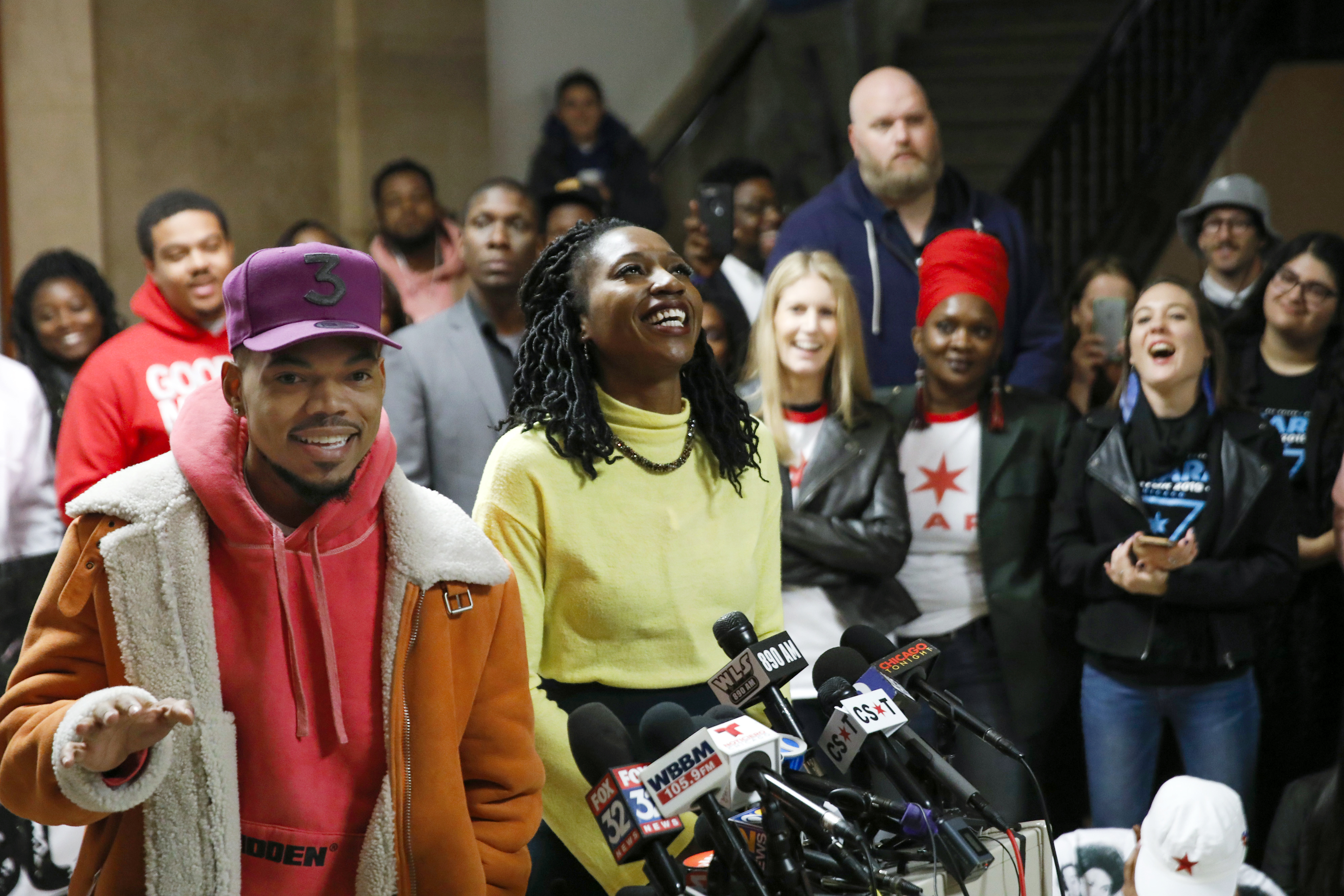Chance the Rapper has 7.9 million Twitter followers — more, it’s safe to say, than all 17 candidates for mayor of Chicago combined. Right now, they’re all reading about a woman who until today was one of the race’s more obscure entries: Amara Enyia, the 35-year-old director of the Austin Chamber of Commerce, and a former policy analyst for Mayor Richard M. Daley. (At the time of this writing, Enyia has 2,944 Twitter followers.)
This morning, on the second floor of City Hall, in front of a dozen TV cameras and twice as many reporters, the hip-hop star gave Enyia what is probably the second most valuable mayoral endorsement out there, after only Barack Obama’s. Chance the Rapper is the most famous person who actually lives in Chicago, and he connects with young people who might not otherwise vote for a mayoral candidate.
“Chicago needs new leadership,” said Chance, wearing his trademark “3” cap at the podium. “It needs a new mayor, so I’m proud to announce that I will not be running for mayor.”
The crowd cramming the hallway outside the City Council chambers laughed, and Chance went on: “It was a lot of different candidates that expressed their worries about me not endorsing them — because they have a higher percentage chance or they were higher in the polls or had more recognition in their name. But I’d like to say, very narcissistically, [that] if I back you, you have a chance. I want to work with somebody that’s about change, that’s about our community, that’s about equity.”
And with that, he backed Enyia.
What’s so significant about Chance’s endorsement is that it represents a generational change, not just in Chicago politics, but in his own family. Last month, Chance’s father, Ken Bennett — an old-school politico who served as an aide to Harold Washington, Barack Obama, and Rahm Emanuel — emceed Toni Preckwinkle’s mayoral announcement at the Chicago Lake Shore Hotel in Hyde Park. That hotel, those in attendance were reminded, was also the site of Washington’s mayoral announcement, and the kickoff of Obama’s campaign for state senate. It was clear that Preckwinkle was hoping to reassemble Washington’s coalition of African-Americans, Latinos, and white liberals — a goal that still motivates aging Chicago progressives today.
But Washington is the avatar of an older generation. The youngest Chicagoan who could have voted for him in 1987 will be 50 years old by next year’s election.
At the Hyde Park event, Bennett talked of meeting Preckwinkle while she was an alderman in the 4th Ward. He said he saw her as “that change agent, that reformer in Chicago [who] was going to take on [the] system of government that has historically locked out individuals throughout the city.”
But that was an earlier version of Toni Preckwinkle — before she raised sales taxes as president of the Cook County Board, and before she endorsed Joe Berrios for county assessor. Today, the 71-year-old Preckwinkle is one of a half-dozen old warhorses who've been kept from the mayor’s office for decades by Richard M. Daley and Rahm Emanuel. For her, this represents a final chance to make it to the Fifth Floor. That’s not the kind of mayor a 25-year-old rapper wants.
Asked about his father’s endorsement of Preckwinkle, Chance said, “At the end of the day, I’m always gonna love my dad. I’ll always rock with my dad. But that has nothing to do with what I see as the future of Chicago.”
Enyia, who's run on a platform of police reform, steering private and public dollars to neighborhood development projects, and requiring Community Benefits Agreements for large construction projects, now has a citywide profile she didn’t have a week ago — and a chance to attract young, left-of-center voters. (She'll also move up from tenth place in our Mayoral Power Rankings next month.)
After Chance wrapped his endorsement, Enyia talked about defending the police department’s consent decree, which would stipulate oversight of CPD by an independent monitor, from a challenge by the Trump administration. She also discussed recruiting progressive aldermanic candidates who will act independently of the mayor. They're issues she largely lacked a platform to speak about before. But with Chance’s imprimatur, she can now sell herself as the new generation of progressive Chicago leadership.



